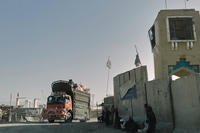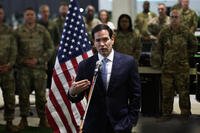U.S. Citizenship and Immigration Services (USCIS) announced Monday that the number of places overseas where noncitizen service members and their families can be naturalized has been cut from 23 to four in a move that critics charge will make it more difficult for them to become citizens.
Noncitizen service members will now have to apply at four "hubs" at Camp Humphreys, South Korea; Commander Fleet Activities, Yokosuka, Japan; U.S. Army Garrison Stuttgart, Germany; and Naval Support Activity Naples, Italy, USCIS officials said in a news release and in a background call with defense reporters.
The consolidation is going into effect "due to the agency's shifting international footprint and office closures overseas," officials said.
Prior to the announcement, USCIS had International Field Offices for handling citizenship applications at 23 U.S. embassies and consulates in 20 countries, a USCIS spokesman said in a followup to the background call.
Related: New Citizenship Policy to Affect Roughly 25 Military Children Per Year, Officials Say
As of Sept. 30, USCIS has closed five field offices in Moscow; Ciudad Juarez and Monterrey in Mexico; Manila in the Philippines; and Seoul, South Korea, the spokesman said. The rest of the scheduled closings will be completed by August 2020, he added.
Each of the hubs will be open for one week in each quarter of the year, and noncitizen service members stationed overseas and their eligible family members will have to make appointments and their own travel arrangements, USCIS said.
"The military has expressed their cooperation with us" on the travel arrangements, a USCIS official said on background. "We don't want them to be necessarily delayed" in processing in the limited one-week time windows, the official added.
Under the new procedures, USCIS officers, in coordination with the Defense Department, "will travel to each hub for one week each quarter to provide onsite naturalization services and answer applicant questions," the USCIS release said. "Appointments will be required so that USCIS officers have case information necessary to complete the process."
In fiscal 2018, USCIS received 347 overseas military naturalization applications. This year, 520 have been received. Of those, 320 were submitted to the Seoul, South Korea, office, one of the places where applications no longer will be processed, the USCIS official said.
Despite fewer places being available for processing, "our priority is to work these as quickly as we can," the official said of the applications.
"Ensuring that the men and women who dedicate their lives to protecting the United States of America can become citizens while serving abroad is of paramount importance," USCIS Acting Director Ken Cuccinelli said in a statement.
"These service members and their families sacrifice so much to keep our country safe and free," he said. "I thank the Department of Defense for partnering with USCIS to ensure naturalization services remain available throughout their deployments overseas."
However, "this will make the process more difficult," Margaret Stock, a retired Army lieutenant colonel and former West Point professor who specializes in immigration and citizenship law, said of the new hub arrangement.
In 2018, she said, USCIS abandoned its policy of beginning the naturalization process for noncitizen service members in basic training. And since then, "applications have been very difficult to file."
Consequently, "filings have been reduced," Stock said via email from her law office in Alaska.
"I can't tell you how many military members are already having problems getting naturalized right now," she said.
And the switch to four overseas hubs will make the process even more cumbersome, Stock noted.
In a letter earlier this month to Defense Secretary Mark Esper and Acting Homeland Security Secretary Kevin McAleenan, more than 45 members of the House cited a "precipitous drop" in the number of noncitizen and legal permanent resident service members "applying for and earning U.S. citizenship in recent years."
"In the second quarter of fiscal 2019, USCIS denied 17.6% of military applications for citizenship -- more than 6% higher than the 11% civilian application denial rate," the letter said.
The denial rate "raises serious concerns that policies by your agencies may be impeding those who have put their lives on the line from seeking and attaining citizenship," the legislators wrote.
The move to cut the number of places where troops can be naturalized overseas comes on the heels of a controversial action by USCIS last month that initially caused confusion in the ranks and sparked outrage by veterans service organizations.
A new policy on Aug. 28 initially appeared to put birthright citizenship in doubt. The first announcement by USCIS suggested that children born to citizen service members and government employees overseas would no longer be automatically considered citizens of the United States.
Cuccinelli later issued a clarifying statement saying that, by law, the overwhelming majority of "babies born to U.S. citizens overseas become U.S. citizens at birth."
The new policy does "not affect anyone who is born a U.S. citizen, period," he said.
The policy would apply to children who live with their U.S. parents abroad, but who did not acquire citizenship at birth, including children adopted by U.S. service members abroad and children born outside the U.S. to service members who are not citizens (such as green card holders), USCIS said.
-- Richard Sisk can be reached at Richard.Sisk@Military.com.
Read more: Navy Says Goodbye to the 'Blueberry' Camouflage Uniform












